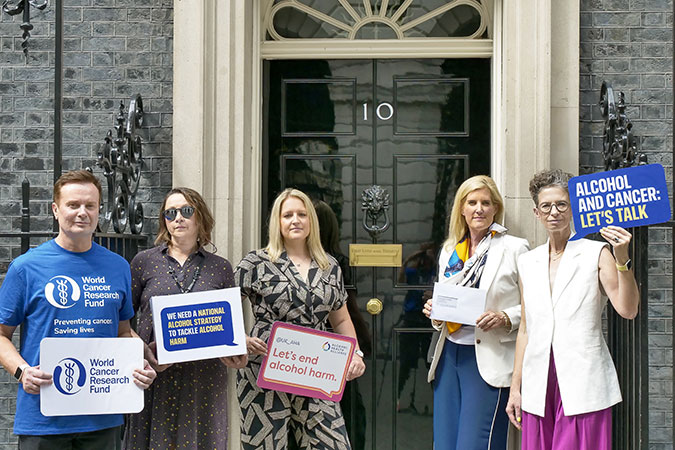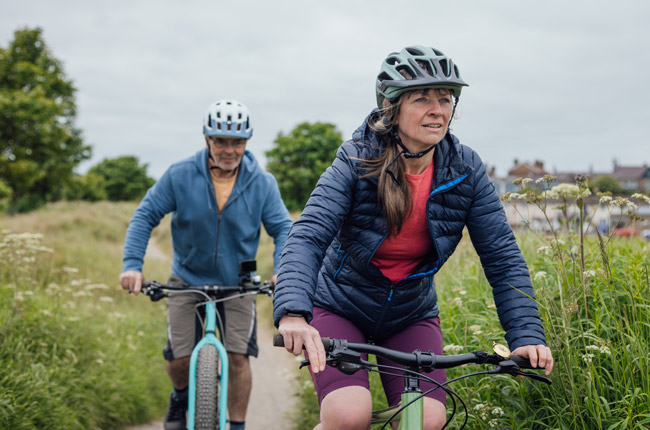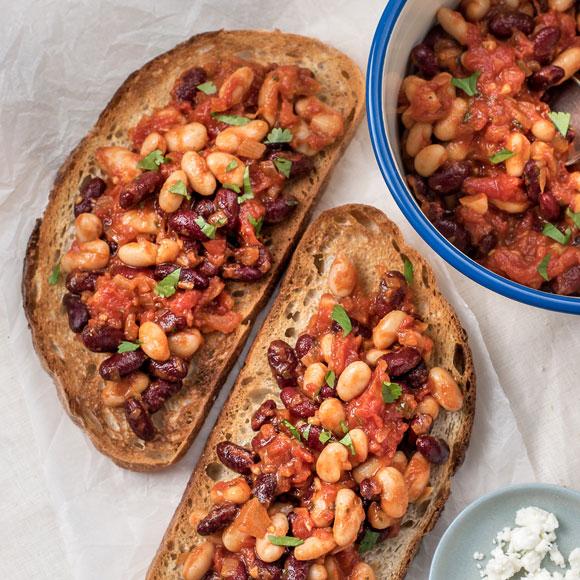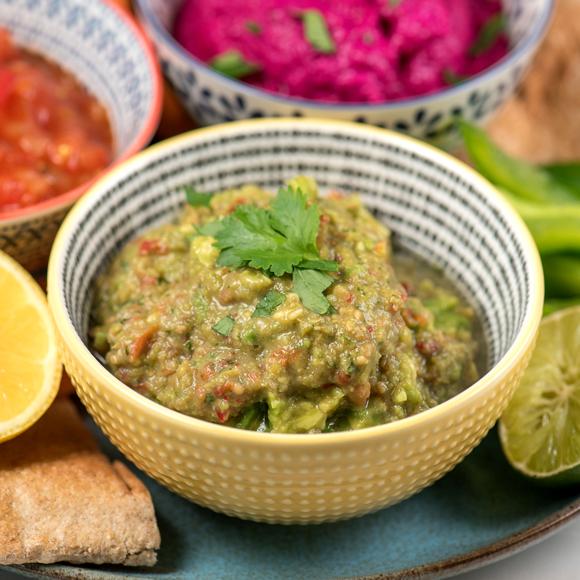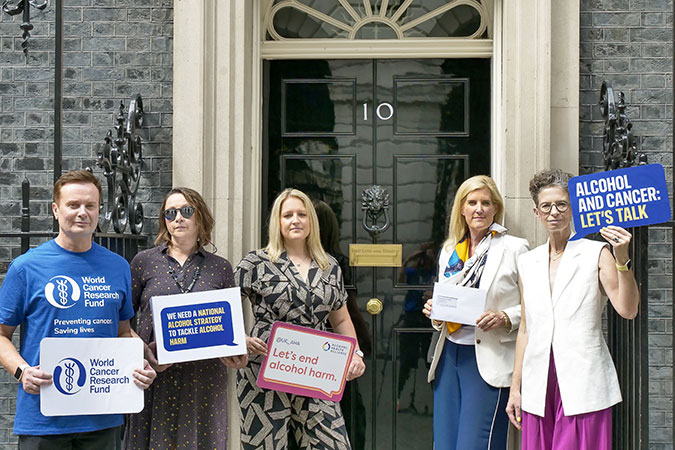The UK government published its 10-Year Health Plan on Thursday, setting out its ambitions to reform the health system and shift the focus from sickness to prevention.
As a cancer prevention charity with a vision of a world where no one dies from a preventable cancer, we welcome the Plan’s direction but there are many key areas of health policy where it simply falls short of what the public needs.
Positive inclusions
Many of the commitments in the Plan had already been announced and were warmly received, such as the expansions of free school meals and the Soft Drinks Industry Levy.
Encouragingly, the Plan also includes new mandatory measures that mark a meaningful step towards creating healthier environments for all.
These include:
- Mandatory healthy food sales reporting for all large companies in the food sector
- A new mandatory Healthy Food Standard to improve the healthiness of sales
- Updates to the Nutrient Profile Model, used to set marketing restrictions on junk food
- A 10% uplift to restore the value of the Healthy Start scheme from 2026 to 2027
- Mandatory labelling on alcoholic drinks to include consistent nutritional information and health warning messages.
- A place-based approach to physical activity, including £250m for 100 places via Sport England, at least £400m for local community sports facilities, and new school sport partnerships
- A national walking and running campaign led by Sir Brendan Foster
- The development of a new physical activity strategy
These measures are welcome steps forward in improving our food and drink environment and enabling people to be more physically active.
We hope the forthcoming Food Strategy will drive deeper systemic changes to ensure affordable, accessible healthy food for everyone in England.
Critical missed opportunities
On alcohol, the Plan falls short of prioritising the range of evidence-based policies proven to reduce alcohol consumption that causes around 17,000 UK cancer diagnoses each year.
Notably, it fails to include minimum unit pricing for alcohol in England, despite its success in reducing alcohol-related deaths in Scotland and Wales. Worryingly, England continues to lag the devolved nations on this crucial policy.
The Plan also makes no mention of strengthening marketing restrictions on alcohol, which enables industry to continue to normalise drinking as an aspirational lifestyle choice.
Given the rising number of alcohol-related deaths each year, we are urging the UK government to urgently deliver a National Alcohol Strategy for England. As outlined in our recent letter to the Prime Minister during Cancer Prevention Action Week, we continue to call for bold action on alcohol-related cancer.
Equally disappointing is the absence of action to strengthen protections and support for breastfeeding and infant feeding. There are no new mandatory, independently enforced regulations on the composition, marketing and labelling of baby and toddler foods. This is a missed opportunity, particularly in light of the UK government’s stated goal to raise the healthiest generation of children ever.
We will continue to urge the government to adopt the recommendations of the Competition and Markets Authority’s market study on infant and follow-on formula.
Turning Ambitions into Action
This Plan arrives as Labour marks its first year in government under Prime Minister Keir Starmer. This government now has the opportunity – and responsibility – to turn its prevention agenda into lasting structural change that improves the nation’s health.
The upcoming National Cancer Plan for England presents a further chance to address modifiable risk factors and fill the gaps left by the 10-Year Health Plan.
We welcome the Prime Minister’s willingness to challenge accusations of ‘nanny statism’ and urge the government to ensure all health strategies are protected from undue industry influence.
We want prevention to be the foundation of all health strategies. We stand ready to bring our scientific and policy expertise to the table – and we’re calling on the UK government to work with us to turn bold ambition into real change, helping millions live longer, cancer-free lives.
Further reading
This year marks the 30th anniversary of the UK Women’s Cohort Study, the initial funding for which came from World Cancer Research Fund. Since its inception, this research – based at the University of Leeds – has grown into one of the largest and longest-running studies of diet and health in the UK. It continues to make a significant impact and serves as a foundation for ongoing research to this day.
The study was set up by Prof Janet Cade, who still works at University of Leeds. We’re looking forward to celebrating the study and its impact with her at a special event on Thursday 3 July 2025. We’d love to hear from any of the 35,000 women who were involved in this study, and would like to celebrate with us, Prof Cade and the team at Leeds.

Documents from the UK Women’s Cohort Study
Get involved
If you were part of the cohort, do contact Michael Clark on 020 7343 4205 or e-mail m.clark@wcrf.org to share your story or to be part of the celebrations.
Research funded by World Cancer Research Fund has shown that people living with cancer who closely follow a sustainable and nutritious diet – the EAT-Lancet reference diet – have a lower risk of dying from cancer and from all causes.
This is the first study to look at the impact of the EAT-Lancet diet on people living with or beyond cancer – as opposed to the general population. Prof Sabine Rohrmann and her team at the University of Zurich, in collaboration with colleagues from another Swiss university, the UK and Austria, used UK Biobank data to see if closely following this diet – with its emphasis on eating a rich variety of plant foods – affected the risk of death for people with a cancer diagnosis at the time they were recruited for the study.
Studying more than 25,000 people with an average age of 60 years at recruitment, the researchers used dietary information collected in the UK Biobank to develop a score that reflected how closely participants followed the EAT-Lancet diet.
More support needed for people facing cancer
Of the 25,348 cancer survivors in the group studied, 4,781 people died during the study follow-up. Prof Rohrmann’s results showed modest links between closely following the diet and a lower risk of dying from cancer, and of dying from all causes. The researchers didn’t observe a link between the diet and dying from heart disease.
Almost 64% of the participants were female, and participants who followed the EAT-Lancet diet more closely were more likely to be female. However, this study confirmed previous evidence showing that people living with and beyond cancer do not tend to follow healthy diets after their diagnosis. This emphasises the need to help people form healthier habits and overcome the barriers to eating well, such as treatment side-effects affecting appetite and taste.
These findings highlight the importance of greater nutrition support and guidance for people facing cancer. Guidelines aimed at the general population are unlikely to consider the needs of people living with and beyond cancer. With a lack of evidence-based recommendations for this population, the gap can sometimes be filled by practices not supported by the science – such as excessive use of dietary supplements.
This evidence showing the benefits of the EAT-Lancet diet follows recent research by our Global Cancer Update Programme, which provided guidance for people with a breast or a bowel cancer diagnosis.
Prof Sabine Rohrmann
We specifically put the focus of our study on cancer survivors because we believe that it is important to encourage them to follow a healthy lifestyle. For this, we need more evidence and so far, research on lifestyle changes in cancer survivors is still scarce.
Dr Julia Panina, Head of Research Funding
This study provides important new evidence that following the EAT-Lancet reference diet may reduce the risk of mortality in people living with and beyond cancer. The focus on the consumption of plant-based foods reflects our Cancer Prevention Recommendations to eat more wholegrains, vegetables, fruit and beans, and to limit red and processed meat. Importantly, these findings also show that diets supporting cancer survivorship can promote more sustainable eating and help protect the environment.
The EAT-Lancet reference diet was created by a team of scientists (The EAT-Lancet Commission on Food, Planet, Health) in 2019. It is a mainly plant-based diet that, according to the Commission, addresses the environmental impact of food production and consumption better than most national dietary guidelines.
> Read the paper: Higher adherence to the EAT-Lancet reference diet is inversely associated with mortality in a UK population of cancer survivors
> On the blog: Plant-based diets: eating for our health and the planet
Seed oils are made by extracting oil from the seeds of various plants, such as:
- Sunflower
- Rapeseed (also known as canola oil)
- Sesame
- Grape
- Flax
- Soybean
- Safflower
These oils are versatile and many are budget-friendly choices in the kitchen. Most have a neutral flavour and a high smoke point, which means they can handle high cooking temperatures – like when you’re frying or roasting – without breaking down or producing unpleasant flavours or potentially harmful compounds. This makes them a safer and more reliable option for everyday cooking.
A particular benefit of seed oils is that they are high in unsaturated fat – the type we should eat more of – and low in saturated fat, which we should eat less of. This makes them a healthier alternative to animal fats like butter and ghee.
Importantly, seed oils provide essential omega-6 fats, which our bodies can’t make so we need them from our diet. These fats support healthy skin, and help build and maintain our cells.
Seed oils and inflammation

You may have seen claims that seed oils cause inflammation. This is mainly because they contain an omega-6 fat called linoleic acid, which can be converted in small amounts into another fat called arachidonic acid – a compound involved in the body’s inflammatory response.
Some people worry that eating too much omega-6 could compete with omega-3 fats, which support heart and brain health, and have anti-inflammatory properties. The concern is that both fats share some pathways in the body, so too much omega-6 may reduce the impact of omega-3s and promote inflammation.
But research doesn’t support this idea. In fact, studies show that people who eat more linoleic acid – the type found in seed oils – often have lower levels of inflammatory markers in the body. Instead of cutting back on omega-6, it’s more important to focus on getting enough omega-3s in your diet by eating oily fish (like salmon), green leafy vegetables (like brussels sprouts) and nuts (like walnuts).
What about cancer risk?
When it comes to cancer, there’s no strong evidence to show that seed oils increase risk. What matters most is your overall diet – we recommend you eat a diet rich in fruit, vegetables, wholegrains, pulses, nuts, seeds and lean proteins like fish and chicken to support your long-term health and reduce cancer risk.
Seed oils in processed foods
Seed oils can be found in ultra-processed products like:
- shop-bought salad dressings
- mayonnaise
- cakes
- biscuits
- crisps
- sweet and savoury pastries
These foods are typically high in salt and sugar, and low in fibre, vitamins and minerals – not ideal for our health.
In fast food restaurants, oils may be reheated multiple times at very high temperatures, which can produce potentially harmful compounds. Most of us don’t cook like that at home.
But it’s important to remember – seed oils themselves aren’t the problem. The real issue is the overall quality of the processed foods that contain them. It’s these foods that are linked to a higher risk of obesity, heart disease, type 2 diabetes and some cancers.
That’s why one of our Cancer Prevention Recommendations is to limit fast food and processed foods that are high in saturated fat, salt and sugar.
So, should I avoid seed oils?
Not at all – and there’s no need to fear them. Seed oils can be part of a healthy, balanced diet. They’re low in saturated fat, provide essential omega-6 fats and offer useful nutrients like vitamins E and K, which support immune health and normal blood clotting.
As with all fats, it’s about using them wisely. They’re high in calories, so stick to small amounts – a teaspoon or a light spray is often all you need. Seed oils are versatile in the kitchen, perfect for roasting, stir-fries, baking, homemade salad dressings or as a healthier alternative to butter or ghee.
References
-
List of journals consulted
Johnson GH, Fritsche K. Effect of dietary linoleic acid on markers of inflammation in healthy persons: a systematic review of randomized controlled trials. Journal of the Academy of Nutrition and Dietetics [Internet]. 2012 Jun 21;112(7):1029-1041.e15.
Laurindo LF, Laurindo LF, Rodrigues VD, Da Silva Camarinha Oliveira J, Boaro BL, Araújo AC, et al. Evaluating the effects of seed oils on lipid profile, inflammatory and oxidative markers, and glycemic control of diabetic and dyslipidemic patients: a systematic review of clinical studies. Frontiers in Nutrition [Internet]. 2025 Feb 7;12.
Petersen KS, Maki KC, Calder PC, Belury MA, Messina M, Kirkpatrick CF, et al. Perspective on the health effects of unsaturated fatty acids and commonly consumed plant oils high in unsaturated fat. British Journal of Nutrition [Internet]. 2024 Oct 28;132(8):1039–50.
Pischon T, Hankinson SE, Hotamisligil GS, Rifai N, Willett WC, Rimm EB. Habitual Dietary Intake of n-3 and n-6 Fatty Acids in Relation to Inflammatory Markers Among US Men and Women. Circulation [Internet]. 2003 Jun 24;108(2):155–60.
Rett BS, Whelan J. Increasing dietary linoleic acid does not increase tissue arachidonic acid content in adults consuming Western-type diets: a systematic review. Nutrition & Metabolism [Internet]. 2011 Jan 1;8(1):36.
Su H, Liu R, Chang M, Huang J, Wang X. Dietary linoleic acid intake and blood inflammatory markers: a systematic review and meta-analysis of randomized controlled trials. Food & Function [Internet]. 2017 Jan 1;8(9):3091–103.
- Report provides further clarity on dietary and lifestyle pattern (DLP) recommendations for breast and colorectal cancer prevention following a comprehensive review of 170 global studies
- Adopting a healthy DLP could also have important environmental and societal benefits, say report authors, and more can be done by policymakers to support adopting a healthy, cancer preventative DLP adoption globally
World Cancer Research Fund (WCRF) International has released a major new report on DLPs and their role in cancer prevention – out today (9 April 2025).
Today’s report emphasises that studying DLPs together, rather than looking at single foods or behaviours, can help researchers and the public to better understand how all these factors together play a role in reducing cancer risk.
An independent panel of experts reviewed the available global evidence on dietary and lifestyle patterns and breast and colorectal cancer. The evidence – which was judged to be strongly associated with cancer risk – was used to develop our new recommendation of a cancer preventative DLP.
What are dietary and lifestyle patterns?
Dietary patterns refer to quantities, proportions, combinations and varieties of different foods, drinks and nutrients, and the frequency with which they are consumed. DLPs refer to a combination of a certain dietary pattern with other measures such as body weight and behaviour-related risk factors including physical activity, alcohol consumption and smoking.
The insights presented in the report can support improvements in cancer prevention strategies, including policy guidance and help populations around the world to adopt healthy DLPs.
The work is part of WCRF International’s Global Cancer Update Programme – the world’s largest source of scientific research on the impact of diet, nutrition, physical activity, and body weight on cancer prevention and living with and beyond cancer.
Two research teams from the Harvard T.H. Chan School of Public Health and the Health Research Institute of the Balearic Islands used CUP Global methodology to conduct a comprehensive review of the research on colorectal and breast cancer incidence and mortality.
WCRF International worked with an expert panel who judged the evidence and made recommendations on the characteristics of a cancer-preventing DLP.
Global Cancer Update Programme collaborator and Professor of nutrition and epidemiology at the Harvard T.H. Chan School of Public Health, Prof Edward Giovannucci, said:
“The work by the Global Cancer Update Programme in reviewing and synthesising the literature on the role of dietary and lifestyle patterns in relation to colorectal cancer risk and mortality represents an immense step forward in how healthy lifestyle habits are key to prevention of cancer.
“The major advancement of this project is in the development of methods of synthesising the data on diet and lifestyle in a more holistic manner, rather than examining piecemeal specific components such as individual foods and nutrients.
“These new findings strongly support that adopting a healthy pattern of diet, maintaining a healthy weight, staying physically active, and embracing health-conscious habits, such as avoiding tobacco and moderating alcohol, are collectively associated with a lower risk of colorectal cancer.”
For colorectal cancer, the panel analysed 86 studies. Based on this evidence, they have recommended a DLP for reducing the risk of bowel cancer that includes:
- Maintaining a healthy weight and regularly taking part in physical activity
- Prioritising fruit and vegetables, as well as fibre-containing foods
- Consuming coffee and food and beverages that contain calcium such as dairy products
- Reducing the consumption of sugar sweetened beverages and alcohol
- Avoiding smoking
- Avoiding eating processed meats
For breast cancer incidence and mortality, the panel assessed 84 research publications and recommended a DLP that includes:
- Maintaining a healthy weight and regularly taking part in physical activity
- Prioritising fruit and vegetables and fibre-containing foods
- Lowering consumption of red and processed meat and sugar-sweetened beverages
- Avoiding alcohol and smoking
Global Cancer Update Programme collaborator and Lead Researcher at the Health Research Institute of the Balearic Islands and the Physiopathology of Obesity and Nutrition Networking Biomedical Research Centre, Dr Dora Romaguera, said:
“Globally, breast cancer is the most common cancer among women. We have conducted the first comprehensive synthesis of the totality of the evidence on the associations between dietary and lifestyle patterns and breast cancer risk.
“Our findings are strengthened by the robust approach to critically assessing the strength of the evidence as part of the Global Cancer Update Programme.
“This report provides clear evidence that by looking at our whole diet and the way we live, there are clear steps to recommend to women to lower their breast cancer risk. Importantly, this work highlights the greatest benefit is found when adhering to most aspects of a cancer preventative pattern simultaneously.
“By looking out our whole diet and the way we live, there are clear steps we can take to minimise our risk of breast cancer.”
In the report, the panel gave a range of recommendations on how to encourage populations around the world to adhere to healthy DLPs. These include:
- It is important that our recommendation for a cancer preventative dietary and lifestyle pattern is tailored to the region. This will only be adopted by individuals and communities and be sustainable if it is seen as culturally acceptable. Because of this, we made every effort to ensure that the constituents are not prescriptive but can be adapted to include foods available globally.
- When developing or updating food-based dietary guidelines, awareness of how the diet impacts, and is impacted by, our changing climate should be communicated.
- For further policy tools to promote our recommendations and our dietary and lifestyle pattern, please refer to WCRF International’s Policy Blueprint. This includes principles for design and implementation of policies, and how policies can be developed to address health inequalities.
World Cancer Research Fund’s Executive Director of Research and Policy Dr Giota Mitrou, said:
“This report outlines barriers and opportunities that exist, which could either prevent or help populations stick to a healthy dietary and lifestyle pattern. A cancer preventative Dietary and Lifestyle Pattern is paramount to sustaining healthy nations and and we hope will have wider benefits for the health of our planet.
“Our recommendations are applicable to all and should also be adapted to reflect specific cultural traditions and local contexts. Dietary and lifestyle changes are unlikely to be possible without wider societal policies that allow for better access to healthy foods and other health behaviours related to cancer prevention.”
Read the published papers
> Breast Cancer and Dietary and Lifestyle Patterns paper
> Colorectal cancer and dietary and lifestyle patterns paper

Sign up to hear more from us
Get the latest cancer prevention-related news and updates straight to your inbox
The term “plant-based diets” has become popular in recent years. These types of diets, which are traditional for some parts of the world (eg in Asia and the Mediterranean region), are rich in vegetables and fruits, plant oils (mainly olive oil), and fish, but consumption of meat and dairy products is traditionally low. Numerous studies have shown that these types of diets are beneficial for human health.
On the other hand, diets of affluent western societies have changed significantly during the past 60 years towards a diet that is rich in meat, refined carbohydrates, sugar, and saturated fats. This type of diet is not only associated with a higher risk of chronic diseases such as cardiovascular diseases, diabetes and several types of cancer, but it also has a strong impact on our planet’s climate.
Production of animal products such as meat and dairy needs more energy than the production of plant products, hence, by reducing our consumption of animal products, we can save significant amounts of energy. For example, in Switzerland, about 30% of environmental impacts are due to food production, transportation and consumption (PDF).
An international group of nutrition scientists has proposed a diet that meets most nutrition requirements, while simultaneously taking sustainability and planetary health into account. This diet is often called the “EAT-Lancet Reference Diet” or “Planetary Health Diet”. It’s mainly plant-based, meaning that carbohydrates come from whole grains, proteins are mainly from legumes (such as beans, lentils, peas, but also soy food and peanuts), and fats are mostly unsaturated plant oils. Animal products are not forbidden, but their consumption is recommended to be limited.

Our research group at the University of Zurich, in collaboration with colleagues from other universities, was interested as to whether this type of diet, which is thought to reduce the damaging impact of food on our environment, also has beneficial effects on our health, particularly regarding the risk of cancer.
To try to answer our question, we needed a dataset in which the food consumption of the participants was assessed, but in which participants were also followed up for a number of years so that we could know how many of them were diagnosed with cancer. The UK Biobank is a large cohort in the UK that includes more than half a million people. Using data from this large cohort, we have examined how closely people were following the recommendations of the EAT-Lancet Reference Diet in 2005–07, and how many of them had been diagnosed with cancer until 2019.
Sustainability lowers cancer risk, too
When we compared those participants whose diet was closest to the EAT-Lancet Reference Diet with those who ate a less sustainable diet, we saw that an environmentally friendly diet was indeed associated with a lower risk of cancer. Better adherence was linked to a 10% lower cancer risk. However, we did not see a particularly strong protective effect for a specific type of cancer.
The results of our study are consistent with those of other groups trying to answer the same research question using different data sets. This strengthens our conclusions that a planet-healthy, plant-based diet can promote health.
In fact, plants are excellent sources of most of the essential vitamins and minerals in our diet. When a plant-based diet is balanced, products of animal origin are only needed in moderation to provide us with the few essential vitamins that cannot be found in plant sources (eg vitamin B12).
Greater focus should be given to exploring different plant-based foods, as well as on how to prepare plant foods – in particular legumes – so that more people are able to cook and enjoy these types of foods. Consumers, researchers and cooks need to team up to develop climate-friendly recipes. In Switzerland, we have published the first cookbook that only contains climate-friendly recipes. And recently World Cancer Research Fund developed Budget-friendly recipes: Good for you, good for the planet.
- Dr Nena Karavasiloglou, a researcher, was formerly a Postdoc at the University of Zurich. Prof Sabine Rohrmann is at the University of Zurich. Read more about their grant funded by World Cancer Research Fund, including papers published from this grant.

Budget-friendly recipes
Get your free copy of our cookbook – good for you, good for the planet!
 Obesity is a public health emergency with England having one the highest rates among high-income nations.
Obesity is a public health emergency with England having one the highest rates among high-income nations.
There are stark inequalities in this country across the ages, geographic areas, genders, ethnic groups and for those with both mental and physical disabilities.
And these inequalities are growing, as rates of children with obesity are increasing significantly faster in communities with high deprivation levels compared to those with low deprivation levels.
And yet when the UK government has the chance to make a difference it is missing the mark.
They recently responded to the House of Lords Committee report entitled Recipe for Health, which set out realistic and transformative recommendations to improve the nation’s diet.
But we were disappointed to see their tepid response with the UK government listing their existing commitments rather than giving a clear signal that they would adopt any of the report’s recommendations.
This raises serious concerns about whether their upcoming National Food Strategy will turn out half-baked.
At World Cancer Research Fund, we want to see bold government policies in cancer prevention and nutrition.
This includes mandatory targets to improve nutritional quality of food, an expansion of the Soft Drinks Industry Levy to unhealthy foods as well as a strengthening of its sugar threshold, and the introduction of a mandatory front-of-pack labelling scheme.
The government must also ensure that the upcoming marketing restrictions on unhealthy foods are enforced without delay.
There is no doubt that the government wants to put prevention policies at the heart of what they do – they set it out clearly in their manifesto.
But with around 40% of cancer cases being preventable, they need to go further and faster on improving the nation’s diet – they need to take up the recommendations in the Recipe for Health report.

Our Cancer Prevention Recommendations
Experts now believe that up to 40% of cancer cases are preventable. These are a blueprint for how to reduce your risk of cancer
The International Agency for Research on Cancer estimates that, by 2050, the world will see 35 million new cancer cases each year, up by 15 million annual cases in 2022. Yet with the right policies to prevent cancer, 14 million of those people could avoid their diagnosis. These policies would need to address a variety of factors, including tobacco, alcohol, overweight and obesity, breastfeeding and unhealthy diet.
Cancer places increasing burden on society
As the cancer burden increases, the strain on our health systems, economies and families becomes harder to meet. Unhealthy weight – just one risk factor – is projected to cost the global economy more than $4 trillion a year by 2035. Our food systems make eating a healthier diet harder. High production and consumption of red and processed meat, and low consumption of wholegrains, vegetables, fruit and beans, plays a role in increased cancer risk and the risk of other diseases such as diabetes. This misalignment also contributes to unhealthy natural environments, as diet-related greenhouse gas emissions are significant contributors to global warming. Most of these are related to production of animal-based foods. This is why prevention is the only sustainable way forward – with resilient populations and food systems working together for public health.
Prevention the sustainable way forward
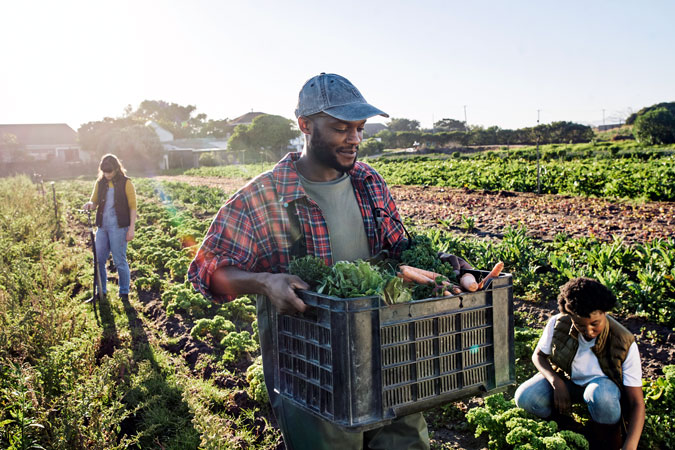 We believe that prevention must be prioritised and is the only sustainable way forward. We also need to better explain:
We believe that prevention must be prioritised and is the only sustainable way forward. We also need to better explain:
- The science around cancer risk and diets, weight, breastfeeding, physical activity, and alcohol – as summarised in our Cancer Prevention Recommendations.
- Which policies should be prioritised to shape healthier environments that minimise these cancer risks for populations.
- How cancer prevention policy can have positive cascading effects for our health, but also for our health systems, our societies and our shared natural environment.
Cancer prevention policies can have ripple effect
We also know that cancer prevention policies can touch on and improve other areas beyond health. For example, diets high in red and processed meat increase people’s risk of colorectal cancer, and that healthier diets made up of more wholegrains, fruit and vegetables can protect people from the same type of cancer. This is why our Cancer Prevention Recommendations say people should limit red and processed meat, and eat a diet rich in wholegrains, vegetables, fruit and beansAt the same time, if our food systems produced less red and processed meat, and animal- food in general, and instead moved towards producing plant-based foods, this would have a significant impact in lowering diet-related CO2 emissions. Policymakers need to make sense of these connections, and our guidance shows what they need to do to promote such positive cycles – or co-benefits.
Why we created the Blueprint
Our well-established Cancer Prevention Recommendations cover 10 ways in which individuals can minimise their risk of preventable cancers. A growing body of evidence is showing that adherence to these Recommendations is associated with lower risk of developing cancer and other NCDs, but also lower risk of dying from cancer.
However, the Recommendations have not – until now – been presented alongside population-level policy advice. We need to promote an integrated approach to preventing cancer, otherwise policymakers may risk formulating repetitive but disconnected policy strategies across these areas that do not speak to or build on each other. For example, marketing restrictions can be a useful tool to encourage healthy diets but are also relevant for promoting breastfeeding and limiting alcohol consumption. Even though the targeted products are different, there are lessons to be learned from policy efforts across different cancer risk factors.
By joining the dots in these different areas, we can create greater awareness of how different policy approaches can contribute to cancer prevention. Our new blueprint makes a compelling case for action, especially for prevention to be included in national cancer plans. The blueprint also reinforces the need for a whole-of-government approach that puts public health goals before commercial interests.
What’s inside the Blueprint?
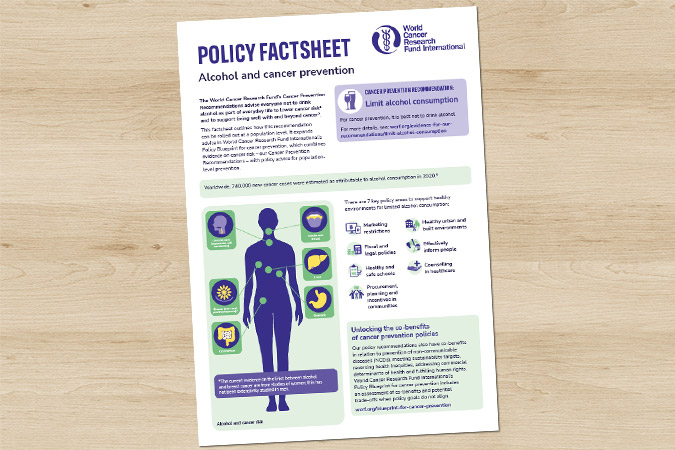
The Blueprint is accompanied by factsheets on specific cancer risk factors.
Our policy blueprint makes the case for population-level policy action and focuses on 5 factors: diet, weight, breastfeeding, physical activity and alcohol – in line with our Cancer Prevention Recommendations. We also look at how these factors can support people living with and beyond cancer
Our blueprint is an essential, evidence-based guide for policymakers and advocates, pulling together tools and resources to provide a comprehensive resource on cancer prevention. It pulls together existing tools and resources to support efforts on cancer prevention, including key guidance for World Health Organization, but also our existing NOURISHING nutrition and MOVING physical activity policy frameworks. All this information is distilled in a package of resources:
- An outline of 8 policy areas – including marketing restrictions, fiscal and legal, procurement, planning and incentives in communities– and how they apply to diet, weight, breastfeeding and physical activity.
- 10 factsheets with in-depth technical detail on how to roll out each Recommendation at population level.
- An exploration of the co-benefits of cancer prevention policy: addressing health inequities; meeting climate and sustainability targets; addressing commercial determinants of health; and fulfilling human rights.
- 7 strategies to help policymakers take action.
The goal of these resources is to strengthen understanding of how environment shapes cancer risk, and what policymakers can do about it.
How it was developed
To develop these resources, we built on our policy work, we reviewed existing key policy documents, and asked experts in the science and policy of cancer prevention, as well as lawyers, advocates for non-communicable disease prevention or breastfeeding what is most important in their respective areas. We then brought all the main elements together.
What’s next?
The Policy blueprint for cancer prevention will now be a centrepiece of our conversations with policymakers going forward – from Member States at the World Health Organization to the UN High-Level Meeting on Non-communicable diseases.
We invite you all to get involved: download the blueprint, share it, and use it in your work.
> Download our factsheets and other policy tools in our resource library
> To give us feedback and share how you want to use the blueprint, write to policy@wcrf.org
Eating a wide variety of food may reduce the risk of gastrointestinal cancers, according to research funded by the World Cancer Research Fund network* and published in the European Journal of Cancer.
Little is known about how eating a wide variety of food species, also known as food biodiversity, may benefit our health or affect our cancer risk. Food species refer to a distinct type of plant or animal, such as wheat, chicken, or salmon. For example, salmon, mackerel, and tuna are all separate food species, even though they share some biological traits and belong to the same food group. Similarly, rocket, lettuce and spinach count as separate food species, even though they are all leafy green vegetables. However, chicken and a chicken’s egg belong to the same food species even though they are different types of food.
This study is the first to examine how the number of different food types consumed, measured as Dietary Species Richness (the number of species an individual consumes per year) affects the risk of the following gastrointestinal cancers:
- Oesophagus
- Throat
- Stomach
- Bowel
- Colon
- Rectum
- Gallbladder
- Pancreas
- Liver
The study followed 450,111 cancer-free adults in 9 European countries from the European Prospective Investigation into Cancer and Nutrition cohort for 14 years. The researchers, from the International Agency for Research on Cancer, found that individuals with the most diverse diets, by including more food species in their diet, had a 23% lower risk of developing gastrointestinal cancers compared with those with the least variety. The risk decreased by 6% for every 10 extra species per year added to their diet. People can do this by including more variety in the types of fruit and vegetables they eat, for example, choosing to eat local and seasonal fruit and vegetables of different colours.
Food biodiversity includes eating different types of food that provide the necessary nutrients for maintaining health. Investigating food biodiversity is important because it has the potential to benefit public health and sustainable food systems.
Dr Helen Croker, our Assistant Director of Research and Policy, said: “Diets have become more limited in the types of foods eaten and they are often high in fat, sugar and salt. However, for cancer prevention, it’s important to eat a healthy, balanced and varied diet with plenty of wholegrains, pulses, vegetables and fruit.”
Dr Helen Croker
This study is particularly interesting because it looks at the number of different foods people eat and the impact it can have on their cancer risk, in particular gastrointestinal cancers. More research is now needed to confirm these findings and further explore the link between dietary diversity and cancer prevention.
Dr Inge Huybrechts
This study shows how a more diverse diet, including a large variety of species, could lower the risk of gastrointestinal cancers, emphasising the importance of eating a wide variety of foods. The idea behind a diverse diet consisting of many types of plants and animals species may provide essential nutrients for the body while also strengthening ecosystems, making them more resilient, productive, and sustainable.
This study was funded by Wereld Kanker Onderzoek Fonds based in the Netherlands, as part of the World Cancer Research Fund International network.
Another study from this grant looked at how food biodiversity is measured. Methods such as Hill numbers estimate the number of species, but it wasn’t clear whether these numbers could be compared across different study settings.
The findings showed that Dietary Species Richness is the most feasible way to measure and evaluate food biodiversity across various contexts, and considering high-, middle- and low-income countries. Regardless of which Hill number was used, however, all measures indicated that greater food biodiversity was associated with better micronutrient sufficiency and with lower rates of all-cause mortality, this latter association yet being strongest for Dietary Species Richness.

At World Cancer Research Fund, our mission is to live in a world where no one dies from a preventable cancer, so of course they’re all designed to help you live a healthier, happier cancer free life!
25 things for 2025
1. Drink more water!
The human body comprises around 60% water, so drinking enough water will help improve your physical performance and increase your energy levels.
2. Eat more beans, legumes and pulses
They’re a great source of protein, iron and fibre, they’re much cheaper than meat and good for the climate.
3. Move more!
Being physically active is important to live a healthy life and it’s one of our Cancer Prevention Recommendations.
There’s also strong evidence that being active protects against cancers of the colon, breast and endometrium.
4. Eat more fibre
We should consume at least 30g of fibre a day. Eating a healthy balanced diet that contains plenty of fibre-rich food helps to support your general health and it helps to reduce your risk of bowel cancer.
5. Drink less alcohol
We have strong evidence to show consuming alcoholic drinks is a cause of 7 types of cancer and that there is no “safe” level of alcohol. Why not try a new mocktail recipe instead?
6. Eat more fruit
Fruit is a vital part of a healthy and balanced diet. It contains a variety of important vitamins, minerals and natural chemicals that our body needs.
7. Check your body regularly
Get into the habit of performing regular self-checks at home. As soon as you see or experience something new or something unusual, see a doctor. Even if it’s nothing, getting checked earlier is always better.
8. Eat more vegetables
Just like fruit (No6), it’s important to eat a range of vegetables. We have some evidence that eating non-starchy vegetables helps protects against some cancers of the mouth and throat.
9. Drink fewer fizzy or sugar-sweetened drinks
There’s strong evidence that regularly having sugar-sweetened drinks lead to weight gain over time, which can increase the risk of 13 types of cancer.
Stick to water or other unsweetened drinks, such as tea and coffee.
10. Eat less processed meat
There is strong evidence that consuming processed meat is a cause of bowel cancer. Ideally, you should cut back on all the bacon, sausages, pork pies and ham that you eat.
Research in 2023 showed that 8,500 bowel cancer deaths per year could be prevented if people stop eating processed meat.
11. Eat less red meat
Just like with processed meat, there’s evidence that too much red meat increases your risk of bowel cancer. But we don’t suggest you completely cut out red meat – it’s a good source of nutrients such as protein, iron, zinc and vitamin B12 so can form part of a healthy, balanced diet.
Our Recommendation is to eat no more than 3 servings of red meat a week. Opt for white meat and fish instead, or go meat-free.
12. Get better sleep
Sleep is vital for a healthy life, so whether it’s ditching screens before bed or establishing a routine, better sleep will have many benefits.
13. Opt for more wholegrains
Wholegrains are the seeds of cereal plants, such as wheat, barley, quinoa, oats, rye, maize (corn) and rice.
There’s evidence that they can decrease the risk of bowel cancer, as well as being a rich source of copper, zinc and dietary fibre.
14. Sign up to Activ8
If you’re looking to get more healthy – whether that’s increasing your activity levels, maintaining a healthy weight or eating better, why not join our FREE 8-week interactive programme?
It will be sent straight to your inbox 📧
15. Eat less fast food
There’s strong evidence that diets containing high amounts of “fast food” and processed foods high in fat, starches and sugars are a cause of weight gain, overweight and obesity, which has been linked to cancers.
A study in 2023 linked ultra-processed food to an increased risk of mouth and throat cancers.
16. Wear SPF and protect yourself from the sun
Each year, around 332,000 people are diagnosed with skin cancer globally, but a high-factor suncream, the right clothing and avoiding the sun between 11am–3pm can help decrease your risk.
17. Try a new recipe
Not only is it fun to cook new dishes, but it also introduces you to new flavours and can get you out of a rut of always cooking the same thing.
We have more than 350 healthy recipes to try – many of which are budget friendly, so you don’t have to break the bank.
18. Eat more protein
Protein is important for us maintaining our health and plays a role in maintaining your muscles, repairing any injuries, keeping your weight down (it keeps you fuller for longer), and it provides energy.
You don’t even need to eat lots of red meat to keep your levels up – nuts, seeds, eggs, wholegrains and pulses are all good sources of protein.
19. Get outside more
Keeping active is important and taking a break from screens and connecting with nature is good for both our mental and physical health.
Plus, spending 15 minutes a day in the sunshine helps restore the body’s vitamin D levels.
20. Ditch the sunbeds
If you want to get a tan, faking it is much safer.
21. Walk an extra 10 minutes a day
Get off the bus/train a stop early, or leave the car at home and walk to the shops. Small things add up quickly and soon you’ll prefer two legs over four wheels.
22. Sign up to our monthly newsletter
Get regular updates on our cancer prevention work, the latest research, health tips, new recipes and much more…
23. Have a meat free day
Or, why not try Veganuary? We’ve already mentioned that limiting red and processed meat is important for cutting your cancer risk.
And a 2022 study showed that following a vegetarian diet could cut your risk of cancer by 14%, so why not explore meat-free recipes.
24. Try a new sport or activity
If you’re in a slump or feeling generally demotivated, why not try something new? And, if sport isn’t your thing, gardening or yoga could get you moving more.
Alternatively, why not join a local group, such as a choir or a craft meet-up. Not only will you be learning something new, but you become part of a community, which provides multiple health benefits.
25. Change one thing
If this list has made you feel overwhelmed, don’t feel as you have to do them all. Start by picking just one thing to do differently and then build up from there. Before you know it, you’ll be thriving!

Sign up to hear more from us
We’ll bring health advice and tips, tasty recipes, the latest cancer research and much more direct to your inbox.
